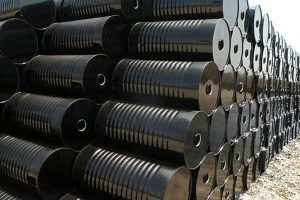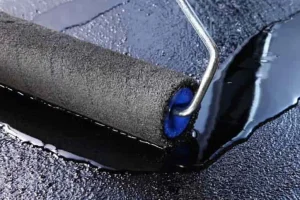What is Drum Bitumen: Specification + Barrel bitumen price
Drum bitumen, due to its easy transportation and storage, is one of the most common and popular packaging methods for selling bitumen in various construction and industrial projects. In this article from Iran ETrade, we provide a guide for purchasing drum bitumen. Everything you need to know about barrel bitumen, from its pricing, different types, the benefits of buying barrel bitumen, and similar topics, is provided in this article.
Buying drum bitumen: How can I purchase barrel bitumen?
You can easily transport and use drum bitumen for construction and road-building projects that require a limited amount of bitumen.
Barrel bitumen is named because of its packaging. Bitumen manufacturers package it in metal drums or similar containers to ensure easy transportation, storage, and efficient use. Drum packaging is highly popular and practical due to the specific characteristics of bitumen, such as high adhesiveness and the need to store it in proper conditions to prevent its quality degradation. 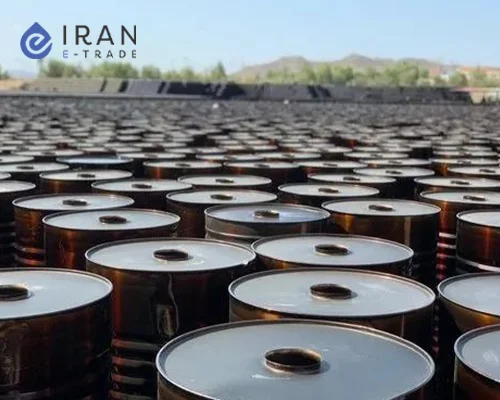 To purchase barrel bitumen, you can try the following methods:
To purchase barrel bitumen, you can try the following methods:
Major bitumen suppliers and manufacturers
1- Petrochemical companies: Some petrochemical companies serve as suppliers and sellers of barrel bitumen.
2- Bitumen manufacturers: Many bitumen manufacturers in Iran offer their bitumen products in drum packaging.
3- Factories providing road construction materials: Some factories that produce raw materials for road construction also supply drum bitumen.
Online ذitumen wholesale markets
Some commercial websites and online platforms, such as Iran ETrade, serve as suitable intermediaries for purchasing drum bitumen at reasonable prices.
Drum bitumen importers and exporters
Trading companies that are involved in the import and export of bitumen can import or export drum bitumen at competitive prices (220 kg barrel bitumen).
Purchasing bitumen through trade shows
Attending trade shows and conferences related to the road building and construction industries can be a great opportunity to connect with manufacturers and suppliers of drum bitumen.
(For more information about Bitumen Applications In Different Industries , refer to the article Bitumen Use In Different Industries) 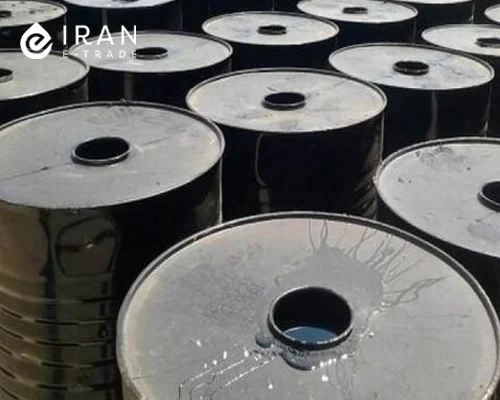
Types of drum bitumen and their applications:
As mentioned, barrel bitumen refers to a type of packaging that facilitates easier transportation and storage of bitumen. Packaging different types of bitumen in metal drums helps protect it from environmental factors and contamination for longer periods. Drum bitumen, due to its strong adhesive properties and high resistance to moisture, has a wide use in construction and road-building projects. Some of its main applications include asphalt paving for roads, and airport runways, as well as waterproofing roofs and various structures. Packaging bitumen in metal drums also makes it easier to transport and use in smaller quantities. The types of barrel bitumen include the following:
Types of barrel bitumen: Drum bitumen 60/70
Drum bitumen with a penetration grade of 60/70 is one of the most popular bitumen products in the road building and construction industries due to its vast range of applications and specific characteristics.
Barrel bitumen 60/70, packaged in metal drums, is known for its unique properties and is widely used across different industries. It also is a penetration-grade bitumen. Barrel bitumen 60/70 is suitable for use in regions with temperate to warm climates. One of the key features of barrel bitumen 60/70 is its average degree of hardness, which provides good resistance to temperature changes. Its high adhesiveness and adequate resistance to environmental factors such as moisture and temperature fluctuations are also notable. Barrel bitumen 60/70 is ideal for use in road construction, highways, and airport runways due to its flexibility and high resistance to heavy traffic. If you wish to know more about the price of barrel bitumen 60/70, contact Iran ETrade.
(For more information about Specification and use Jumbo Bag Bitumen, refer to the article Jumbo Bag Bitumen)
Types of drum bitumen: Mixed bitumen 85/25
Drum bitumen 85/25 is suitable for applications that require high flexibility and a low softening point due to its unique combination of physical and chemical properties.
Barrel bitumen 85/25 is packed in metal drums. It has a penetration grade of 85 and a softening point of 25. The penetration grade indicates the hardness of the bitumen, while the softening point denotes the temperature at which the bitumen begins to soften. The combination of these two characteristics makes bitumen 85/25 a versatile material with specific applications. One of the prominent features of barrel bitumen 85/25 is its high penetration grade, which allows it to maintain good flexibility at lower temperatures. Due to its flexibility and low softening point, 85/25 bitumen is suitable for applying thermal and moisture insulation in buildings and underground structures. These properties help the bitumen retain its adhesive qualities in cold weather and resist cracking. Barrel bitumen 85/25 is ideal for the production of mastics and sealants that require high flexibility and adhesion.
(For more information about price and use bitumen 85/100, refer to the article bitumen 85/100) 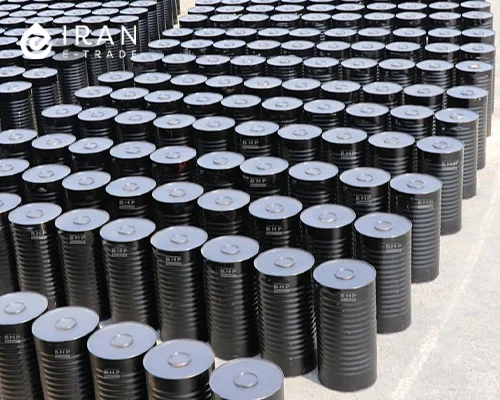
Types of drum bitumen: Bitumen emulsion
Because of its ease of use, high efficiency, and reduced environmental risks, drum bitumen emulsion is suitable for various projects.
Manufacturers produce barrel bitumen emulsion as an emulsion in water. Then, they package it in metal drums for easy transportation and storage. Therefore, bitumen emulsion consists of bitumen, water, and an emulsifying agent. This process allows the bitumen particles to remain suspended in the water, creating a stable and homogeneous mixture. In addition, Bitumen emulsion has minimal viscosity. Furthermore, one of its important features is that it does not require heating, which saves time and energy. Bitumen emulsion has good adhesiveness, making it perfectly suitable for applications requiring this trait. Also, because it uses water as a carrier, bitumen emulsion is more environmentally friendly compared to traditional bitumen. Barrel bitumen emulsion has wide usage in production of cold asphalt. Cold asphalt does not require heating and road builders can easily use it at ambient temperatures.
Types of barrel bitumen: Blown drum bitumen
Purchasing blown drum bitumen is an ideal choice for producing construction and industrial products due to its high thermal stability, resistance to brittleness, and strong adhesion.
Manufacturers produce blown barrel bitumen by blowing air into pure bitumen. In this process, hot air is injected into the bitumen, altering its molecular structure and physical properties. The result is bitumen with a higher softening point and less brittleness. The manufacturers typically package it in metal drums for easy transportation and storage. Blown bitumen has a higher softening point than pure bitumen, making it suitable for use in higher temperatures. Its strong resistance to flow and deformation makes it suitable for a wide range of applications. Blown barrel bitumen is a common choice in the production of roof plates, waterproofing membranes, and other building materials. Additionally, the rubber and plastic industries use blown bitumen as an additive to improve the physical properties of products.
Drum bitumen MC (Medium-Curing)
MC drum bitumen, with its medium curing trait, good viscosity, and high adhesion, is a common product to use in prime coat operations, tack coating (fusing layers), producing cold asphalt, and surface repairs for roads.
(Click to learn about MC Bitumen.)
MC barrel bitumen is a type of liquid bitumen that the manufacturers combine with petroleum solvents to achieve a medium curing time (slow-setting). The manufacturers typically package this mixture, which contains 64% bitumen, in metal drums to facilitate its transportation and storage. Due to its unique properties, various Industries, particularly construction and road building, use MC bitumen. One of the main applications of MC bitumen is to produce the prime coat to seal and prepare the underlying surface before laying the asphalt. This process enhances the adhesion between asphalt layers. MC barrel bitumen is also a good choice for producing cold asphalt, which does not require heating. The medium curing trait of this bitumen provides sufficient time for performing various executive operations.
(For more information about price and use bitumen 50/70, refer to the article bitumen 50/70) 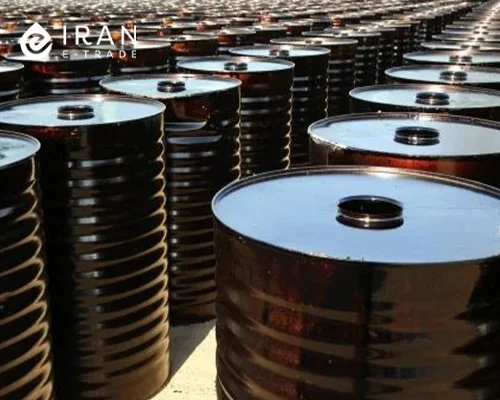
How is the price of drum bitumen specified?
Determining the price of drum bitumen is a complex process influenced by several factors which include: the type and quality of the bitumen, its supply and demand levels, crude oil prices, production and transportation costs, foreign currency rates, economic and political conditions, the selling season, and technological advancements in its production. Producers and buyers of bitumen must consider these factors to make informed decisions regarding the sale and purchase of bitumen.
Type and quality of bitumen
The price of drum bitumen varies significantly depending on its type and quality: pure bitumen, blown bitumen, bitumen emulsion, MC bitumen, etc.
Market demand
The level of demand for drum bitumen in domestic and international markets has a direct impact on its pricing. Higher demand typically leads to an increase in the price of barrel bitumen.
Bitumen supply
The amount of bitumen supply from its producers also affects the price of drum bitumen. A shortage in supply can lead to an increase in barrel bitumen prices.
Crude oil price
Crude oil prices heavily influence the price of drum bitumen, as bitumen is a petroleum product. Therefore, fluctuations in oil prices directly affect production costs and the final price of barrel bitumen.
Production costs
Production costs include expenses related to the extraction, refining, manufacturing processes, and packaging of bitumen. These costs play a significant role in determining the final price of drum bitumen. 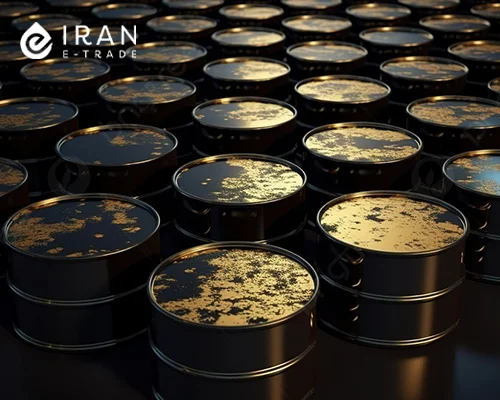
Transportation costs
Transportation costs, especially when exporting bitumen to far-reaching markets, significantly impact the price of drum bitumen.
Exchange rates
In international markets, fluctuations in exchange rates can significantly affect the price of bitumen, especially in the case of exporting drum bitumen.
Economic conditions
Overall economic conditions, such as periods of recession or economic growth, affect the demand for and the price of drum bitumen.
Political circumstances
Political changes, sanctions, and government regulations can also affect the price of drum bitumen.
Seasonal changes
Demand for bitumen typically increases during the spring and summer months due to a rise in construction and road-building activities, which can lead to higher prices for drum bitumen during these periods.
Technological advancements
Improvements in bitumen production and processing technologies can affect production costs and ultimately influence the final price of drum bitumen. 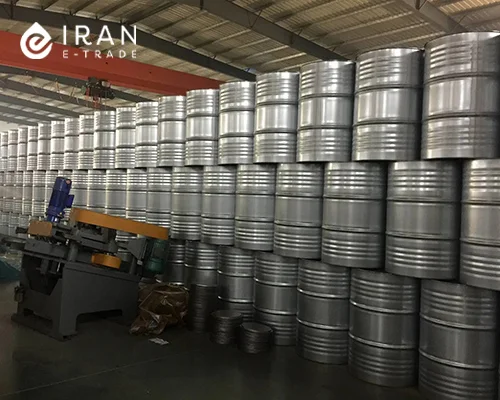
Price of mixed drum bitumen
To accurately specify the price of mixed drum bitumen, comparing the prices offered by several suppliers through Iran ETrade is the best approach. Mixed barrel bitumen is a polymer product. Therefore, several factors influence its pricing. For instance, the type and composition of the mixed bitumen have a significant impact on its final price. Additionally, the prices of raw materials, such as crude oil and additives used to enhance the properties of the bitumen, as well as costs associated with production processes—including energy consumption, equipment maintenance, and labour—also affect the price fluctuations of barrel bitumen. On the other hand, the type of packaging for bitumen and transportation costs, especially in international markets, can constitute a significant portion of its price. If you wish to know more about the price of mixed barrel bitumen, please contact Iran ETrade.
Price of soft drum bitumen
The price of soft drum bitumen is influenced by factors such as the type of bitumen, its production and packaging costs, fluctuations in crude oil prices, transportation costs, and exchange rates. Overall, this price may vary in domestic and international markets and can change periodically. To obtain an accurate and up-to-date price for purchasing soft barrel bitumen, it is usually necessary to ask the suppliers and review current market conditions.
Price of hard drum bitumen
As previously explained, various factors influence the price of hard drum bitumen. These factors are: the type and quality of bitumen, its production and packaging costs, currency fluctuations, and supply and demand. As a result, the price of hard barrel bitumen is usually updated daily. 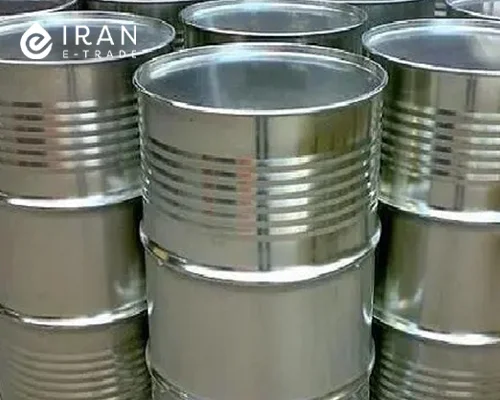
Price of hard carton-packed bitumen
The price of hard bitumen in carton packaging differs from that of drum bitumen. Several factors affect this price difference, including:
Packaging type
Hard bitumen in carton packaging usually has lower prices compared to drum bitumen due to reduced production and transportation costs. Suppliers typically use carton packaging for smaller quantities and specific applications, while drums are more suitable for larger volumes of bitumen.
Transportation costs
Carton-packed bitumen generally has lower transportation costs compared to drum bitumen, as cartons are typically lighter and more compact.
Volume and quantity of bitumen
The price of hard drum bitumen is higher due to its larger volume and the need for specialized transportation and storage.
Storage and usage
Hard bitumen in metal drums has a higher price due to its better quality maintenance and ease of use in large quantities. As a result, carton-packaged hard bitumen is generally cheaper compared to hard drum bitumen. 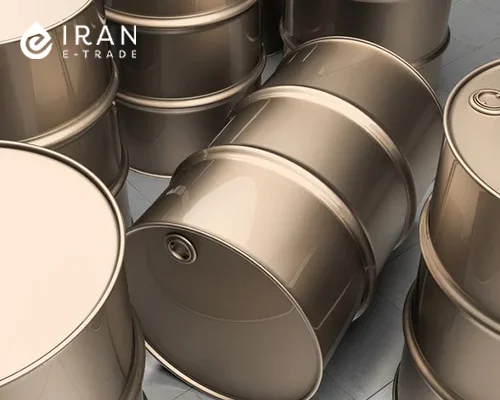
The price of 220-litre drum bitumen
The price of 220-litre drum bitumen can vary significantly based on these factors: the type of bitumen, costs of production and raw materials, demand and supply, market conditions, and exchange rates. For accurate and up-to-date pricing of 220-litre barrel bitumen, visit the Iran ETrade website. There, you can find prices from various bitumen suppliers and producers, making it easy for you to compare them.
Price of 60/70 drum bitumen
Crude oil’s price is very important in affecting The price of 60/70 drum bitumen. Other key factors include bitumen production and packaging costs, transportation expenses, demand in domestic and international markets, economic conditions, and exchange rates. For up-to-date pricing of 60/70 barrel bitumen, contact Iran ETrade.
Price of 85/25 drum bitumen
Several factors influence the price of 85/25 drum bitumen and can lead to significant price fluctuations. In recent years, due to sanctions, decreased domestic production, and global market volatility, bitumen prices in Iran have seen a 10-20% increase. The price of 85/25 bitumen, or any other type, is typically determined per kilogram or ton. 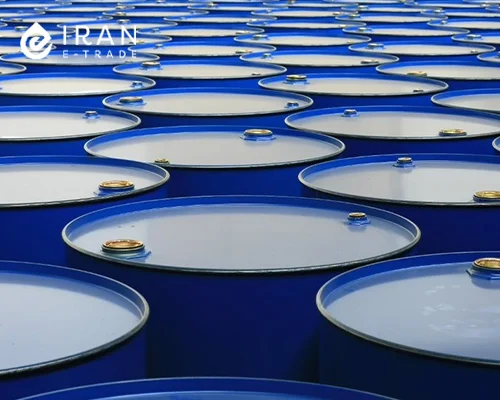
How to order drum bitumen
The process of ordering drum bitumen involves several steps, from identifying the customers’ needs to the final delivery of the product. In the following sections, we will explain the main steps for the ordering of barrel bitumen:
Identifying the customer’s needs
Before purchasing bitumen, it is essential that you thoroughly and professionally determine which type of drum bitumen (such as pure bitumen, blown bitumen, emulsion bitumen, or mixed bitumen) you need. You also have to determine what specifications (such as penetration grade, and type of packaging) should your desired bitumen product have.
Determine the quantity
Specify the volume and number of drum bitumen based on the needs of your project or personal consumption.
Find a supplier
Research various suppliers of drum bitumen through websites (such as Iran ETrade), dealerships, and other reputable industry sources.
Price Inquiry
Request pricing for drum bitumen from multiple suppliers to compare its prices and sales terms. Add Iran ETrade, we can do this process for you. 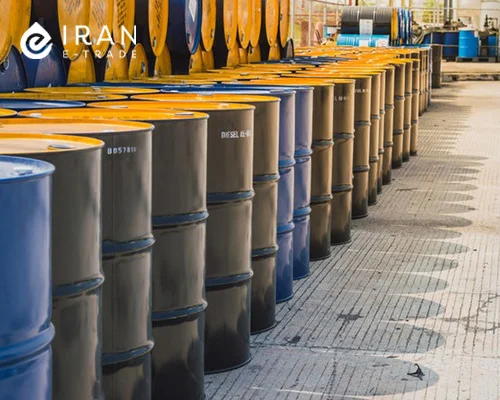
What are the most important features of drum bitumen?
Because of its specific characteristics, drum bitumen’s use is very common in the construction and road-building industry. The important features of barrel bitumen include: viscosity, waterproofing, resistance to weather conditions, chemical resistance, adhesive properties, thermal stability, ease of transportation, and drying time. These features make barrel bitumen a highly effective and versatile material in various construction and road-building projects. The most important features of barrel bitumen are:
Viscosity
The viscosity of drum bitumen refers to its degree of stickiness and resistance to flow. Different types of bitumen have different viscosity and are selected based on project requirements and working conditions.
Waterproofing
Drum bitumen has natural waterproofing properties and prevents water from penetrating underlying surfaces. This feature makes it very important for use in building roofs, foundations, and other surfaces that require protection against moisture.
Resistance to weather conditions
Drum bitumen must be resistant to various weather conditions, including rain, snow, sunlight, and temperature fluctuations. This feature is essential for its durability and long lifespan in applications such as roads and building coatings.
Chemical resistance
Drum bitumen must be able to withstand various chemicals and pollutants. This resistance makes it suitable for use in industrial environments or contaminated areas (those exposed to corrosive substances).
Adhesion
Drum bitumen must adhere to various surfaces and create a strong bond. This adhesion makes the bitumen suitable for use in repairs, sealing, and asphalt overlaying and other surfaces.
Thermal Stability
Drum bitumen must be stable at different temperatures and retain its properties. This feature of bitumen is important for its use in various temperatures and for applications in which bitumen is affected by temperature.
Easy transportation
Bitumen has to be packaged and transported in a way that allows for easy and safe transportation without contamination or loss of quality. Drum bitumen, with appropriate packaging, is very suitable for transportation to different locations and use in projects in remote places.
Drying Time
The drying or curing time of bitumen refers to the duration it takes for the bitumen to harden or reach its final state. Drying time is important for project scheduling and planning executive operations. Drum bitumen should have an appropriate drying time to ensure that engineers carry out subsequent operations correctly. 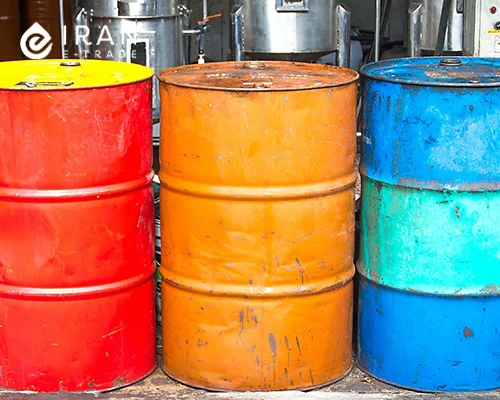
What is the weight of drum bitumen?
The weight of drum bitumen depends on factors such as the volume of the drum and the density of the bitumen. Suppliers usually package bitumen in standard metal drums with a volume of 220 litres (equivalent to 55 gallons). The weight of a 220-litre barrel bitumen is usually 240 to 260 kilograms (including the weight of the drum), which differs based on the density of the bitumen and the weight of the drum. To determine the weight of barrel bitumen, it is also necessary to consider its density.
Drum volume
Standard volume: Drum bitumen typically has a capacity of 220 litres (55 gallons).
Bitumen Density
Standard density: The density of drum bitumen typically ranges between 1.0 and 1.2 kilograms per litre (kg/L). However, this value can vary depending on the type of bitumen and the temperature.
Calculating the weight of bitumen
To calculate the weight of barrel bitumen, you can use the following formula: Weight of bitumen = Barrel volume × Bitumen density 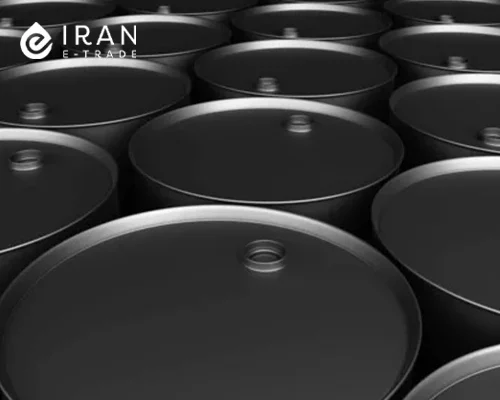
What type of drum bitumen is suitable for construction purposes?
For construction purposes, various types of drum bitumen are available, each with specific properties that make them suitable for particular applications. Selecting the appropriate type of bitumen depends on the specific requirements of the project and environmental conditions. Below are different types of barrel bitumen suitable for construction uses:
Pure bitumen (soft bitumen)
This type of drum bitumen has a certain penetration grade (common penetration grades: 60/70 or 85/25). Engineers and road workers use it as a standard bitumen in the industry for asphalt production, road paving, and building sublayers in construction projects.
Blown bitumen
The manufacturers produce blown drum bitumen by blowing air into liquid bitumen. Blown bitumen has high resistance and flexibility. It also has penetration grades (between 40/50 and 70/100), which makes it suitable for building protective layers resistant to harsh weather conditions, insulation coatings and highly resistant asphalts.
Bitumen emulsion
The manufacturers produce drum bitumen emulsion in liquid form and mix it with water and emulsifiers, making it easy to use. This type of bitumen is suitable for sealing, surface repairs, and improving the properties of soil and underlying rocks in construction projects.
Modified bitumen
The manufacturers produce modified bitumen by adding polymers to bitumen to improve its physical and chemical properties. These types of drum bitumen are good for applications that require high resistance to temperature and weather changes, such as insulation layers for roofs and durable coatings. 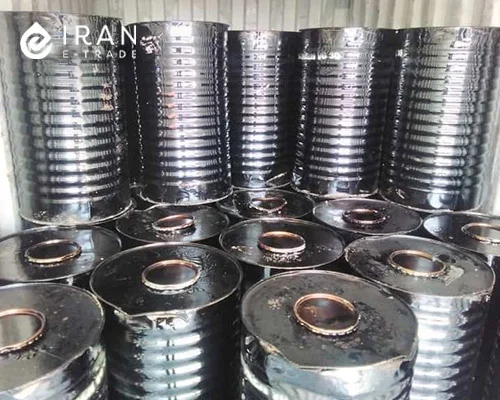 reference
reference
- Bitumen Suitable for Hot Climates: Benefits + Key Technical Tips
- How to Use Nano Bitumen: Properties & Applications + Method...
- Petroleum Products and Petroleum Derivatives: Introduction + Uses
- Oil Refineries in Iran: Complete List + Comparison
- Gasoline Producing Refineries in Iran: 12 Major Refineries
- Largest Oil Producers in the World: The Top 13 Countries...



